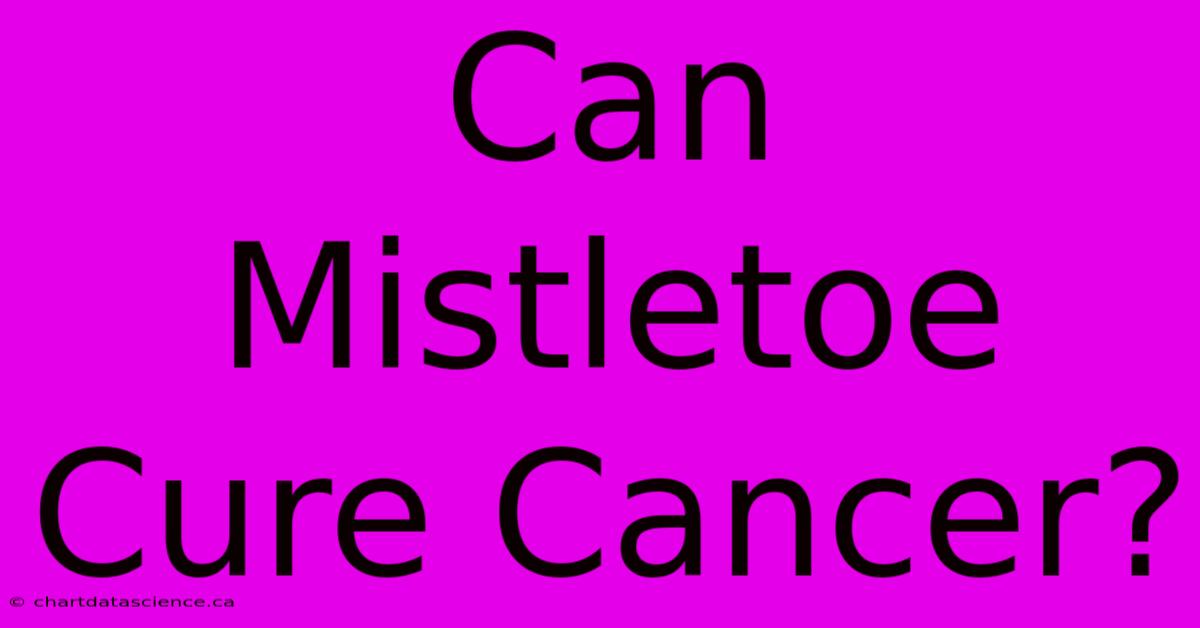Can Mistletoe Cure Cancer?

Discover more detailed and exciting information on our website. Click the link below to start your adventure: Visit My Website. Don't miss out!
Table of Contents
Can Mistletoe Cure Cancer? Separating Fact from Fiction
The holiday season often brings images of mistletoe, a plant traditionally associated with kissing and good luck. But beyond its festive role, mistletoe has a long history of use in alternative medicine, particularly in the treatment of cancer. However, the question remains: Can mistletoe cure cancer? The short answer is no. While mistletoe extracts have shown some activity in laboratory settings and limited clinical trials, there is no conclusive scientific evidence to support its use as a cancer cure or even an effective primary treatment.
Understanding Mistletoe Extracts and Their Use
Mistletoe (specifically Viscum album) is used to create extracts that are injected or taken orally. Proponents claim these extracts boost the immune system, directly fight cancer cells, and improve the quality of life for cancer patients. These claims are largely based on small-scale studies and anecdotal evidence, not large-scale, rigorous clinical trials.
What the Research Shows (or Doesn't Show)
While some studies have indicated that mistletoe extracts may have some effects on certain types of cancer cells in laboratory settings, these findings are far from conclusive. Crucially, these studies do not translate to effective treatment in humans. Furthermore, the quality and standardization of mistletoe extracts vary significantly, making it difficult to draw reliable conclusions from existing research.
Many studies showing potential benefits are hampered by:
- Small sample sizes: The number of participants in many studies is too small to provide statistically significant results.
- Lack of control groups: Some studies lack proper control groups, making it difficult to determine if the observed effects are due to the mistletoe extract or other factors.
- Poor methodology: Some studies have methodological flaws that limit the reliability of their findings.
- Publication bias: Studies showing positive results are more likely to be published than those showing negative results, creating a skewed perception of the effectiveness of mistletoe.
The Dangers of Relying on Mistletoe for Cancer Treatment
Relying solely on mistletoe extracts for cancer treatment is extremely dangerous. It can lead to:
- Delayed conventional treatment: Delaying or foregoing proven cancer treatments like chemotherapy, radiation, or surgery can significantly reduce chances of survival and successful remission.
- Adverse side effects: Mistletoe extracts can cause a range of side effects, including allergic reactions, inflammation, and even serious cardiovascular problems.
- Drug interactions: Mistletoe extracts can interact negatively with other medications, potentially leading to harmful consequences.
- Financial burden: Mistletoe treatments can be expensive, putting a significant financial strain on patients and their families.
The Importance of Evidence-Based Cancer Treatment
Cancer treatment should always be guided by evidence-based medicine. This means relying on scientific research and clinical trials to determine the most effective and safest treatment options. While exploring complementary therapies alongside conventional treatments may offer some patients comfort and potentially improve quality of life, these should never replace evidence-based cancer treatment.
Always consult with an oncologist or other qualified healthcare professional before considering any alternative cancer treatments, including mistletoe extracts. They can provide accurate information, assess your individual needs, and develop a personalized treatment plan based on the latest scientific evidence. Making informed decisions based on sound medical advice is crucial for successful cancer treatment and overall well-being.
Conclusion: Hope, but Not a Cure
While the idea of a natural cure for cancer is appealing, it's essential to approach such claims with skepticism and rely on evidence-based information. Mistletoe extracts show some promise in limited research, but there is no scientific evidence to support their use as a cancer cure. Conventional medical treatments remain the most effective and safest approach to cancer treatment. Always seek guidance from qualified healthcare professionals for accurate information and personalized treatment plans.

Thank you for visiting our website wich cover about Can Mistletoe Cure Cancer?. We hope the information provided has been useful to you. Feel free to contact us if you have any questions or need further assistance. See you next time and dont miss to bookmark.
Also read the following articles
| Article Title | Date |
|---|---|
| Holiday Tree Recycling Program Details | Dec 25, 2024 |
| Actors Heartfelt Christmas Prayer | Dec 25, 2024 |
| A Relaxing White Christmas Setup | Dec 25, 2024 |
| White Christmas A Quiet Setting | Dec 25, 2024 |
| Find Open Austin Cvs Stores Christmas 2024 | Dec 25, 2024 |
